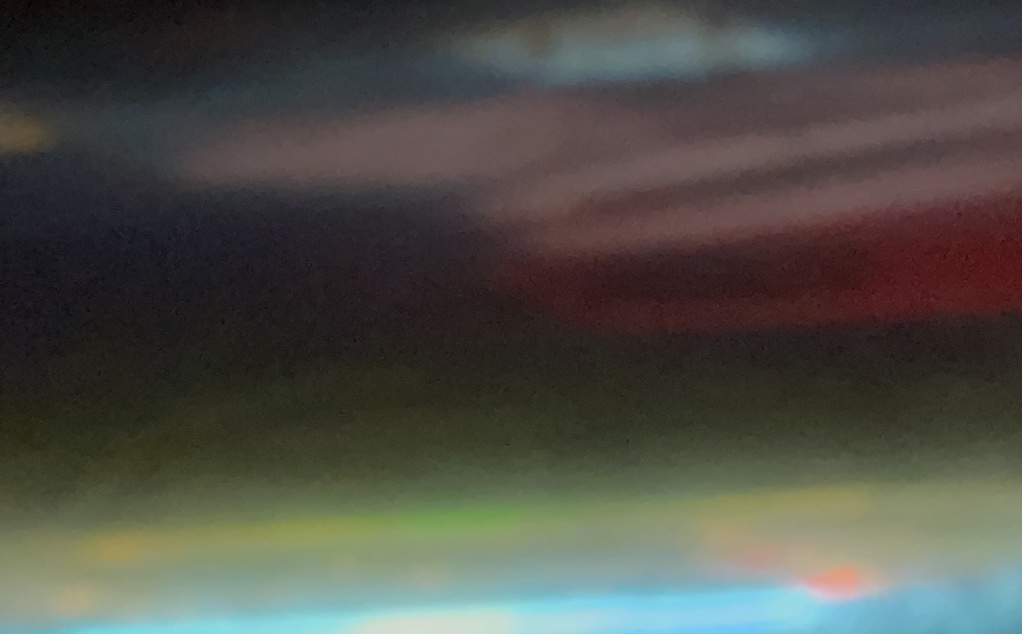
Pseudokarst. Photograph by Whitney Smith, ©2022. [o]
ONE HUNDRED YEARS AGO
I am a hundred years old
As I scrub this floor
On hands and knees,
My knees
Becoming one with
The knots
In the pine,
My fingers
Stretching out and out
Into thin strands
Of polished grain,
My body
Covering all
In a molecule thick layer
Of liquid
Which might be water
Or may be blood
I can't remember
Because I dream
Of swaying
In high up winds,
My beauty
Beckoning to all
And I am old;
One hundred years old
Before the axe hews me down.

Aurora. Photograph by Whitney Smith. ©2022. [o]
BLACK SPRUCE
My life belongs here
In this primordial place
Where black spruce pierce the sky
And gashes of water lap their roots.
My hermitage is a shack
The wood stove ticks as it heats
And fingers of warmth reach out
Between the gaps in the board walls.
The ice is on the lake now
Creaking, snaps of gunshot in the night
As tree limbs rattle their icicle fingers
Like judgmental skeletons.
After a robust life
My body aches with fatigue
Blisters dot my hands
And the axe handle gleams with
The oil from my skin,
But the sleeping swan stretches her wings wide
And keeps the sleep from my eyes.

'Sailor Dream 1'. Photograph by Whitney Smith, ©2022. [o]

The author fills out
The Wild Culture Scribbler’s Questionnaire
1 What is your first memory and what does it tell you about your life at that time and your life at this time?
My parents fighting. I learned compliance in those early years and still try not to rock the boat, except in my writing.
2 Can you name a handful of artists in your field, or other fields, who have influenced you — who come to mind immediately?
Margaret Atwood, Alice Munro, dozens of poets.
3 Where did you grow up, and did that place and your experience of it help form your sense about place and the environment in general?
Northern Scotland surrounded by farmland. Being outside with the animals became my favourite place.
4 If you were going away on a very long journey and you could only take four books — one poetry, one fiction, one non-fiction, one literary criticism — what would they be?
The New Oxford Book of Canadian Verse, 1983, Margaret Atwood, Lord of the Rings Trilogy, JRR Tolkien, Poetic Meter and Poetic Form, Paul Fussell, Don't know.
5 What was your most keen interest between the ages of 10 and 12?
Horses.
6 At what point did you discover your ability with poetry?
1991, after the birth of my child when I no longer had time to dedicate to novels.
7 Do you have an ‘engine’ that drives your artistic practice, and if so, can you comment on it?
It’s like a deep layer of chocolate cake that if I ignore becomes covered in flies.
8 If you were to meet a person who seriously wants to do work in your field — someone who admires and resonates with the type of work you do, and they clearly have real talent — and they asked you for some general advice, what would that be?
Sit down and write.
9 Do you have a current question or preoccupation that you could share with us?
Who am I when I retire from my job?
10 What does the term ‘wild culture’ mean to you?
The great pulsing beauty all around us.
11 If you would like to ask yourself a final question, what would it be?
Have I planted enough native plants in my garden?

F. KATE LANGAN is a writer and poet. Among her books are The Art of Worship, The Vision and Craft of Contemporary Nova Scotian Artists, and The Grand Plan: A Tale of Romance, Crime and Boatbuilding. Currently a caretaker in a school for special needs children, she lives in Dartmouth, Nova Scotia.

Add new comment